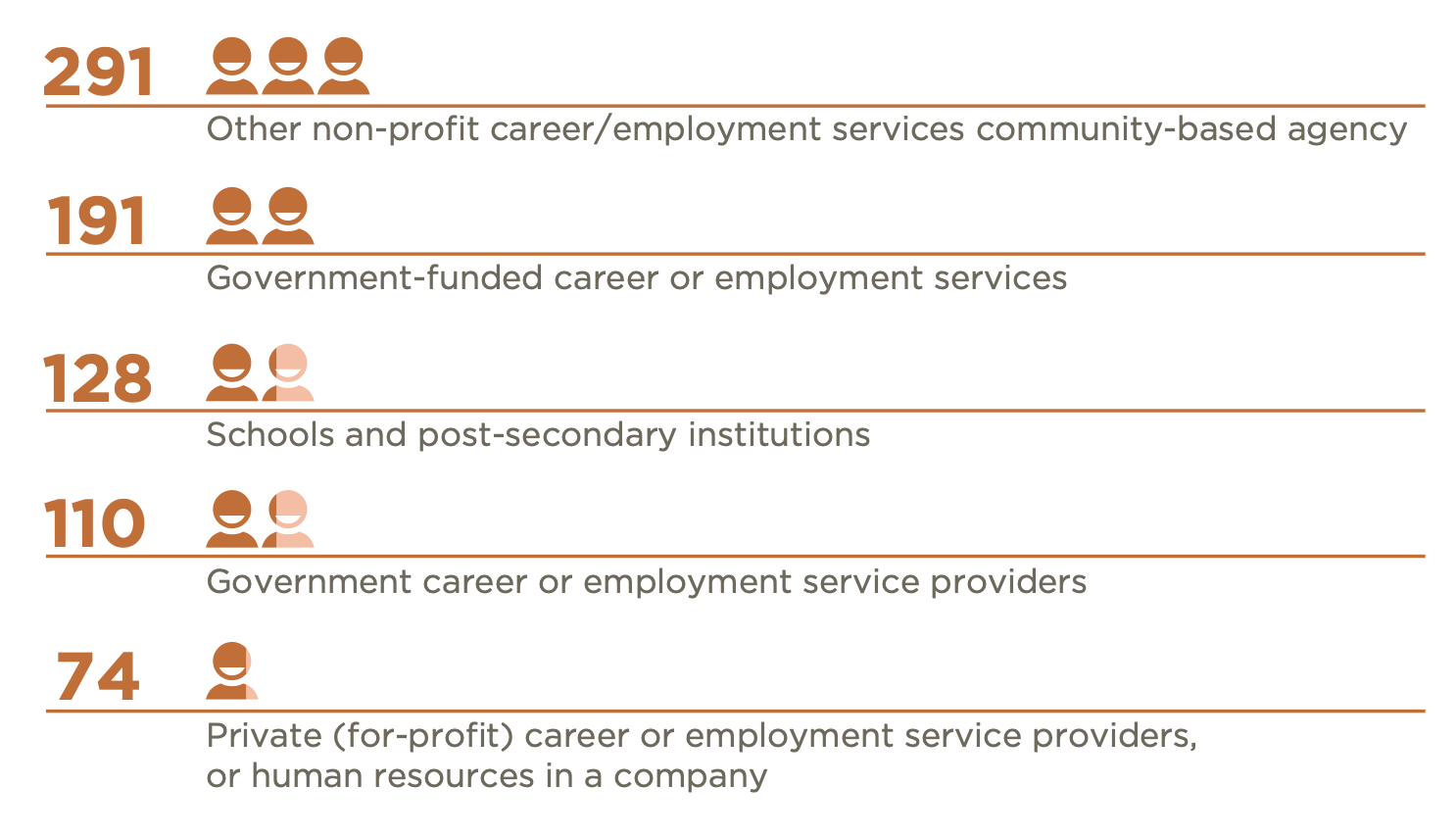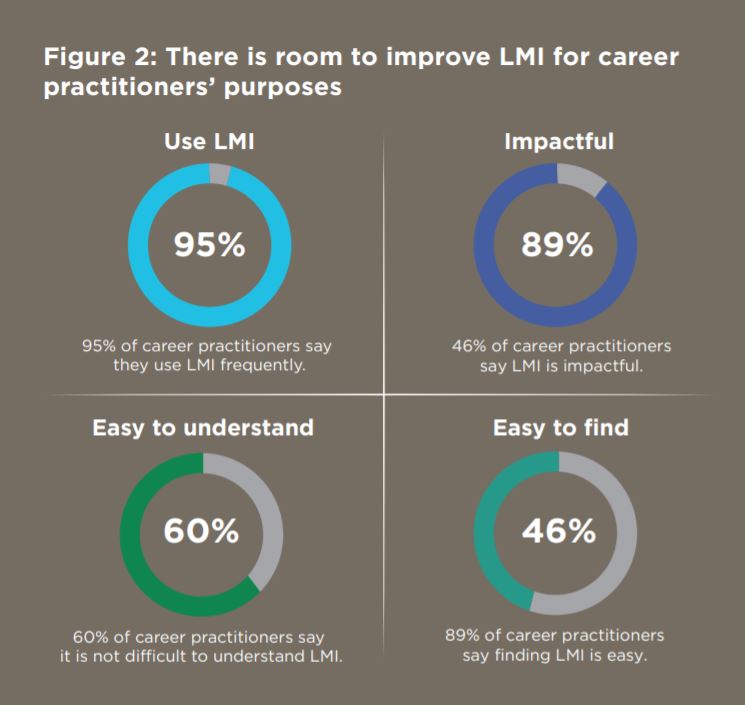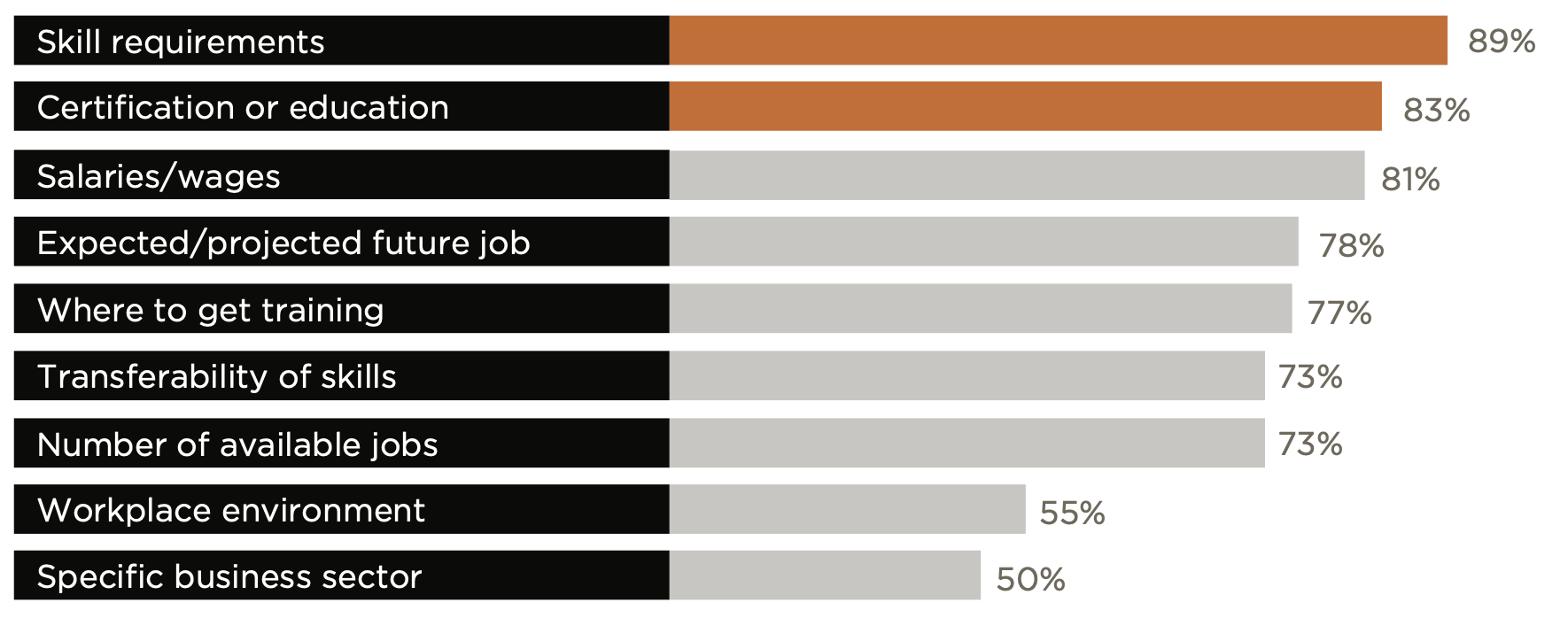Table of Contents
Key Findings
- Most Canadians who seek assistance with career-related decisions already have some idea of what information they need, but they are having difficulty finding or understanding the available data
- Only three of five career practitioners we surveyed (60%) think labour market information is easy to understand, and fewer than half (43%) say they have received training to help them access or make sense of the data.
- To support clients, practitioners most frequently look for information about skill requirements (89%), certification or education (83%) and salary/wages (81%).
- To better support their clients, career practitioners require data that are up to date, trustworthy and user-friendly
- The lack of local-level detail in occupational outlooks significantly limits their usefulness.
Introduction
Our Survey Results by Population Groups presents key findings about what Canadians say are their most common labour market information needs and challenges. We posed similar questions to career practitioners: professionals who help students, job seekers and other Canadians navigate the world of work. They practice in a variety of settings including universities and colleges, non-profit employment agencies, corporate human resources departments and private practices, to name a few (see Figure 1).
From helping Canadians assess their career goals, skills, personality traits and interests to teaching them how to understand and use labour market information (LMI), career practitioners can be an indispensable resource in preparing workers for the uncertainty of today's rapidly changing workforce. As part of our ongoing Public Opinion Research Project, we surveyed 873 career practitioners across Canada1 to better understand how they use labour market information in their practices (see Box 1). Our findings indicate that 95% of career practitioners use LMI, but face many of the same hurdles that Canadian workers do in finding and understanding information to support their decision making. In fact, fewer than half (46%) of career practitioners surveyed said it was easy to find relevant labour market information. Compared with individual Canadians, they are more likely to acknowledge difficulty in
making sense of this information (60% of career practitioners versus 65% of all Canadians feel LMI is easy to understand) (see Figure 2).
In this LMI Insight Report, we report these survey results and highlight career practitioners' role as vital partners in finding and interpreting labour market information.
Box 1: Survey Methodology
We partnered with Forum Research to conduct a survey of Canadians and their labour market information use and appreciation. We conducted nine independent surveys in total, each targeting a specific group of interest such as employed people, unemployed people, persons with disabilities, recent immigrants, recent graduates, current college/university students, parents, employers and career practitioners. This LMI Insight Report presents the results for career practitioners.
A total of 873 respondents completed the survey between July and November 2018. Respondents were invited to participate by the Canadian Career Development Foundation, which reached out to its network of career practitioners. Every possible effort was made to cover as many provinces and territories as possible.
Helping Canadians Make Sense of Labour Market Information
The results of our pan-Canadian analysis show that almost all career practitioners (95%) incorporate labour market information into their practices, either "often" (65%) or "sometimes" (30%). They use LMI largely to answer clients' specific questions (90%) rather than as a tool to explore career options.
Indeed, nearly three out of four career practitioners surveyed say their clients usually come in asking for specific labour market information. Most already have some idea what information they need to make educational and career decisions, but have difficulty finding or understanding the available data. This finding reinforces research showing that LMI might be better consumed through an intermediary.2 In other words, when it comes to making sense of LMI, career practitioners play a key supporting role.
Figure 1: The career practitioners we surveyed work for a variety of organizations

It is interesting to note that career practitioners assess their clients' ability to make sense of LMI on their own as lower (56%) than what the general Canadian population reports (65%). This might suggest that those seeking career-related assistance are slightly less confident in their ability to transform labour market information into actionable insights compared with Canadians as a whole.
Is Training the Solution?
As noted above, just over half of the career practitioners we surveyed (60%) felt LMI was easy to understand. This is concerning given the key role they play in helping Canadians understand the labour market. Moreover, fewer than half (43%) received specialized training to help them access or make sense of career or labour market information. Of those who did receive training, only about 10% said it had any impact on their practice.
In other words, there is a call for both better LMI tools and products, as well as for better training for career practitioners focused specifically on how to integrate LMI into their practices effectively. It is important to make sure that career professionals have relevant information in hand and adequate training to support informed decision making among those they serve.
Figure 2: There is room to improve LMI for career pracitioners' purposes

What Do I Need to Land My Dream Job?
We asked career practitioners which types of information they commonly look for when helping clients. They report skill requirements (89%) and certification or education requirements (83%) as the most frequently sought information types (see Figure 3).
Salary and wage information (81%) is also frequently sought by clients, individual Canadians and employers. This substantiates the view that clients come to career practitioners equipped with some idea of what they want to do, but need help understanding how to reach their goals (e.g., the skills and training they need and the salary they can expect to earn).
No matter how the data are sliced, however, information about skill requirements is the most salient type of LMI sought by clients and career practitioners. The high frequency with which career practitioners look for this information suggests it has high value. This finding is consistent with the responses we collected from individual Canadians. To that end, we are collaborating with Statistics Canada and Employment and Social Development Canada (ESDC) to assess ways to better understand the skill requirements of jobs (see LMI Insight Report No. 16, Bridging the gap between skills and occupations).
Figure 3: Skill and certification/education requirements top the list of nine types of labour market information that career practitioners look for when supporting clients

Tic Toc: Timely Data are Key
Another important message extracted from the data is that not all labour market information is created equally. When asked about the features of LMI that are most important in supporting their clients, nearly all career practitioners (90%) select timeliness (i.e., up-to-date information). They also indicate that they highly value information that is user-friendly (81%) and trustworthy (80%). Furthermore, they prioritize LMI being publicly and freely available (78%). Providing timely, reliable, free LMI is a core goal of LMIC, and is essential for career practitioners and job seekers, who often face resource constraints and challenging trade-offs.
The message for labour market information producers is clear: to be relevant to career practitioners, data must be up to date and trustworthy; to be understandable, the data must be user-friendly.
Insights Into the Future
As part of our public opinion research, we explored the challenges that individual Canadians face in looking for and using LMI. Across all groups surveyed, approximately one quarter of Canadians cite a lack of future insights as a barrier to using LMI in career decisions. Next to a lack of relevance, this is the second most frequently reported challenge.
Figure 4: Up-to-date information is the most important feature of LMI for supporting clients

In Canada, industries, private organizations, and federal, provincial and territorial governments forecast the future demand for occupations over medium and long-term. These job forecasts (also known as occupational outlooks) describe an occupation's expected growth or decline. Given the importance of future insights for individual Canadians, we wanted to explore the use of these tools by career practitioners.
We learned that nearly eight out of ten career practitioners (78%) often support clients by looking at which occupations are expected to be in demand. In fact, this is the fourth most commonly consulted type of LMI sought among the career professionals we surveyed.
Unfortunately, three quarters (75%) express disappointment with this information, with most (55%) saying the projections are not geographically detailed enough to be helpful. Indeed, projections are typically conducted at the pan-Canadian or provincial levels. Moreover, among career practitioners who say they do not incorporate occupational outlooks into their service delivery, the lack of geographic detail was the explanation most frequently offered.
The Way Forward
To make informed choices and find work that matches their skills, expectations and goals, people need to know where to find LMI and how to make personal sense of it. Career practitioners play a key roll in helping workers and job seekers access and interpret LMI, make grounded decisions and successfully navigate into and across the labour market. The survey results presented here provide a first step toward better understanding the uses, challenges, types and features of LMI needed to support individuals' career and educational decisions from the perspective of career professionals.
At LMIC, our mandate is to help Canadians make informed career-related decisions by increasing awareness, expanding accessibility and improving the quality of labour market information. This includes identifying where gaps in LMI exist and, in partnership with governments and public and private organizations, making this information available. This is especially true for providing local and granular information on skills, which we have identified as a main concern for all LMI users. Moving forward, we will continue to conduct indepth and qualitative research into the types of information that Canadians want and need, and how best to communicate it. This work will help support the efforts of career practitioners and other intermediaries who represent an important resource for Canadians in their career planning, decisions and actions.
Acknowledgments
This LMI Insight Report was prepared by Anthony Mantione of LMIC. We would like to thank our National Stakeholder Advisory Panel (NSAP) for its support in designing and distributing the survey. In particular, we would like to thank our chair, David Ticoll (Information Technology Association of Canada), and Sareena Hopkins (Canadian Career Development Foundation) for their support.
For more information about this LMI Insight Report or other LMIC activities, please check out our Publications page. You may also contact Anthony Mantione at anthony.mantione@lmic-cimt.ca or Tony Bonen (Director, Research, Data and Analytics) at tony.bonen@lmic-cimt.ca.
Check out the survey dashboard and previous editions of LMI Insights Report discussing the needs, challenges and difficulties of finding labour market information. Additional results will be made available as analyses are completed.
End Notes
- Although we attempted to reach career practitioners in all jurisdictions, we were unable to find respondents in Nunavut and Yukon.
- For example, Marc Verhoeve, a careerpathing consultant from Ontario, notes that adolescents and adults have very limited knowledge of occupations other than those in which their family members or neighbours work. Career practitioners help broaden this knowledge by incorporating LMI about occupations that aren't necessarily close to home.


